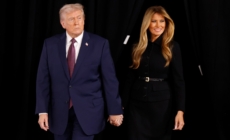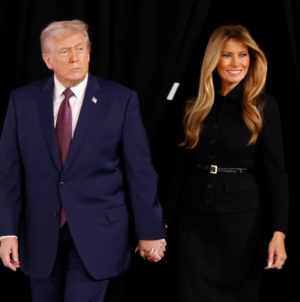-
How Melania and Donald Trump’s Favorability Ratings Compare - 24 mins ago
-
Two Chinese Journalists Are Detained for Reporting on Corruption - 34 mins ago
-
Trump Repeats Call to ‘Nationalize’ Elections, as White House Walks It Back - about 1 hour ago
-
A first look at Elephant Valley inside San Diego Zoo Safari Park - 2 hours ago
-
Ex-Capitol Police Officer Harry Dunn Seeks Maryland House Seat - 2 hours ago
-
Tax billionaires, cut rents and other takeaways from California’s first gubernatorial debate - 2 hours ago
-
Russia and Ukraine Resume Talks After a Huge Attack by Moscow - 3 hours ago
-
Are We at the End of the Industrial Age? - 3 hours ago
-
Renee Good’s Brothers Call on Congress to Rein In Immigration Crackdown - 4 hours ago
-
Winter Weather Warning As Seven Inches of Snow To Hit: 'Poor Conditions' - 4 hours ago
L.A. business leaders frustrated by tariffs, immigration raids

When more than a dozen business leaders gathered in downtown Los Angeles on Tuesday, many were talking about the closure of a treasured local spot.
Cole’s French Dip, a restaurant that has been serving the downtown area for more than 100 years, announced Monday that it would be permanently closing its doors.
“You can’t name tariffs as the sole reason” for the closure but it’s one of them, said Nella McOsker, the president and chief executive of Central City Assn. of Los Angeles.
McOsker was one of several participants in a roundtable hosted by California Atty. Gen. Rob Bonta to discuss the impacts of tariffs on industries across the state.
If California were a country, its economy would be the fourth-largest in the world. The state is the nation’s largest importer and second-largest exporter.
“Because we have such an outsized economy, the impacts of the tariffs are outsized on us as well,” Bonta said.
When speaking with reporters after the discussion, Bonta said the picture the business leaders painted was “devastating.” The “unpredictability and uncertainty that the tariffs have created” were a key component of the conversation, he said.
Business leaders are unable to make deals, to “budget long term, to invest or expand or have capital expenditures,” he added.
One of those to voice frustration was Jason Hodge, commissioner of the Port of Hueneme, who said the ripple effects of the Trump administration’s trade policy are “frightening.”
“Uncertainty is what’s killing all of us more than anything else,” Hodge said. “We’re seeing [it] trickle down to not just the trucking agencies who are being squeezed, so they’re having to outsource local jobs; we’re seeing it with our shipping customers and partners, because they’re not looking to invest in facilities right now when there’s so much uncertainty in the market.”
California filed a lawsuit in April contesting President Trump’s executive authority to enact international tariffs without congressional support. The suit marked the first challenge from any state against Trump’s trade policy.
“We’re going to continue to fight for California’s businesses, for our business community, for our small businesses, our large businesses who deserve better than the devastating impacts and uncertainty, unpredictability of these tariffs,” Bonta told reporters.
Many local leaders also said the recent spate of Immigration and Customs Enforcement raids in Los Angeles and the surrounding areas have had negative consequences for their businesses and industries at large.
Carlos Singer, chief of policy at the L.A. Area Chamber of Commerce, described the current economic and political climate as “a period of really intense flux, both here locally and certainly out of D.C.”
“The uncertainty, whether it’s on global trade volatility or on the ICE enforcement actions, it’s wild, and it’s deeply unsettling at an emotional, community, education, healthcare and, certainly, at a business level,” he said. “Now is the time to marshal whatever evidence we can to make it clear to this administration and to anyone else who will listen that this is not good for business. This is not good for America.”
The Trump administration has said foreign trade and economic practices have created a “national emergency” because of the trade deficit. President Trump maintains that the imposition of tariffs will “strengthen the international economic position” of the United States and protect American workers.
Bonta said business leaders should be able to rely on the federal government for support.
“It’s disappointing,” he said. “But unfortunately, it’s what we kind of expect from this federal government.”
Source link











